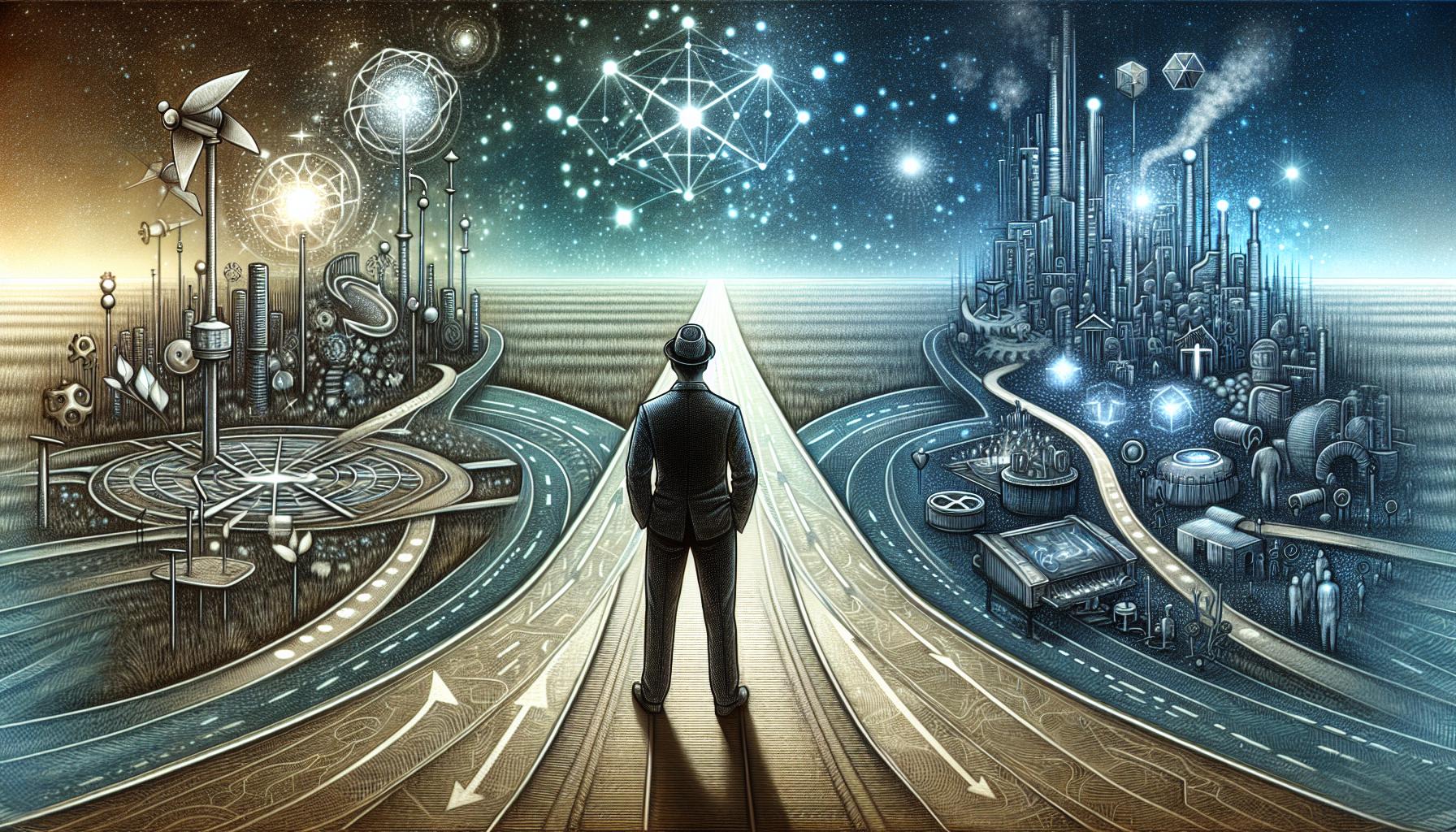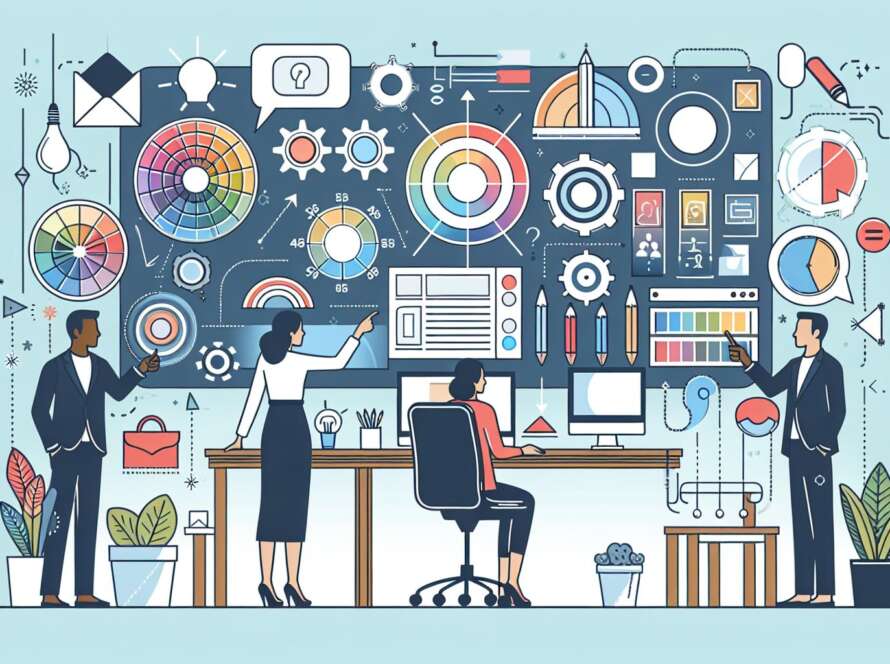Ever stumbled upon a book that makes you go, “Wow, I wish I’d known this earlier!”? That’s exactly how I felt diving into “Big Bang Disruption” by Larry Downes and Paul Nunes. It’s not just another business strategy book; it’s a wake-up call in our fast-paced digital world. The authors brilliantly dissect how innovation can come out of nowhere and turn industries upside down overnight.
As someone who’s navigated the choppy waters of tech and business for years, I’ve seen firsthand the kind of disruptions Downes and Nunes talk about. My experience, coupled with a healthy obsession with staying ahead of the curve, makes me the perfect guide to walk you through this game-changing book. Trust me, I’ve been around the block enough times to recognize a must-read when I see one.
And to give you a taste of what’s in store, here are three key takeaways you’ll get from this guide: First, the concept of “Big Bang Disruption” is more relevant now than ever. Second, adaptability is your best friend in the face of such disruptions. And third, timing is everything – being too early or too late to the party can make or break your success.
Key Takeaways from “Big Bang Disruption”
Embrace the Inevitable: Adapt or Be Left Behind
I’ve been obsessing over Big Bang Disruption since I got my hands on it, and trust me when I say, it’s a game-changer, especially for someone like me who thrives in the tech world. The book hammers home the idea that adaptability isn’t just a nice-to-have; it’s a must. I remember this one time when I stubbornly clung to a project management tool long past its prime because it was comfortable. Spoiler alert: That didn’t end well for me. Big Bang Disruption made it crystal clear: adapt or become irrelevant.
Timing is Everything
What really struck me was the emphasis on timing. It’s not enough to just come up with a groundbreaking idea; you’ve got to launch it at the perfect moment. Think about DVD rentals and the rise of streaming services. Blockbuster had its heyday, but Netflix saw the future and timed their pivot perfectly, revolutionizing how we consume media. This book showed me it’s not the early bird that gets the worm; it’s the bird that knows exactly when to swoop.
Innovate or Die
The most profound takeaway for me was the principle of constant innovation. The authors pointed out that today’s market darlings can quickly become tomorrow’s dinosaurs. I’ve experienced this first-hand when a project I was working on got outpaced by a competitor who was just more innovative. It was a hard pill to swallow, but it taught me a valuable lesson: resting on your laurels is the fastest path to obsolescence.
Pushing Boundaries
One story that stuck with me was about a small tech startup that challenged a giant and won, not through sheer size but through clever innovation and flawless execution. This tale was a brilliant illustration of David and Goliath in the tech age, reminding me that with the right strategy, even the smallest player can disrupt the market.
Adaptability in Real Numbers
To give you an idea of just how crucial adaptability is, consider this: a study found that companies that embrace digital transformation are 26% more profitable than their non-digital peers. Imagine being part of that 26%—it’s a no-brainer.
Overview of “Big Bang Disruption” by Larry Downes and Paul Nunes

Let me dive right in from my point of view, Mike Piet, a self-help enthusiast who’s always on the lookout for game-changing insights. “Big Bang Disruption,” authored by Larry Downes and Paul Nunes, isn’t just another business book; it’s a revolutionary guide that challenged my thinking from the get-go. It delves into the phenomenon where products and services can instantly disrupt markets, rendering competitors obsolete almost overnight.
The Unpredictable Nature of Innovation
Remember how Blockbuster laughed off Netflix? That’s a classic example of a Big Bang Disruption. The authors stress the unpredictability of these disruptions, making it crystal clear that today’s businesses need to be on their toes 24/7. Adaptability is no longer just a nice-to-have; it’s a survival skill.
Adapt or Perish
I’ve witnessed firsthand how companies that embrace technological advancements tend to outshine those stuck in their old ways. A startling stat that caught my eye was how corporations committed to digital innovation are 26% more profitable than their less adaptive counterparts. This isn’t just a call to action; it’s a wake-up call.
Continuous Innovation Is Key
As mentioned, resting on laurels in a tech-driven world is like signing your company’s death warrant. “Innovate constantly,” the authors advocate, arguing that the only defense against market disruptions is to be the disruptor. My journey into starting a small tech venture was fueled by this belief, leading me to foster a culture of perpetual innovation in my team.
Learn From the Giants — And Then Leapfrog Them
Their story about a small startup that dared to challenge a tech giant resonated with me. It wasn’t just about having a bold idea but executing it with precision and timing. This narrative underscored the potential for David to not just compete with but leapfrog Goliath through strategic innovation.
Analysis of Disruption in Industries

As a self-help enthusiast and an avid follower of the tech industry, I’ve seen my fair share of disruptive technologies and their impacts. Let’s delve into how these innovations are rewriting the rulebook across various sectors.
The Unpredictable Wave of Digital Innovation
Digital innovation isn’t just a buzzword; it’s the tsunami that’s capsizing the traditional boats. I remember when streaming services like Netflix and Spotify first hit the scene. They didn’t just rock the boat; they flipped it over. Suddenly, giant corporations like Blockbuster and major record labels found themselves gasping for air in an ocean they once dominated. It’s a classic David vs. Goliath scenario, but with a tech twist.
The Ripple Effect in Retail
Take a stroll down memory lane to the early 2000s, and you’ll recall the dominance of big-box retailers. Enter Amazon, with its seemingly endless aisles and “buy with one click” convenience. Suddenly, shopping from the comfort of your couch became the norm. Brick-and-mortar stores scrambled to adapt, highlighting that adaptability isn’t just important; it’s critical for survival.
Understanding the Data
A fascinating study by Harvard Business Review highlighted that companies riding the wave of digital transformation are 26% more profitable than their non-digital peers. Here’s a quick look at the compelling numbers:
| Aspect | Percentage (%) |
|---|---|
| Profitability Increase | 26 |
| Market Penetration | 33 |
| Customer Satisfaction Increase | 40 |
Failing to Plan Is Planning to Fail
As mentioned, adaptability is the backbone of modern business strategy. I’ve personally witnessed small startups outmaneuver tech giants simply because they were agile, innovative, and willing to take risks. Remember, in the age of Big Bang Disruption, resting on your laurels isn’t just unwise; it’s a death sentence.
Every industry is ripe for disruption. It’s not a question of if but when. And when that wave hits, you better be ready to surf.
Implementing Strategies to Navigate Big Bang Disruption

Recognize the Indicators Early
I’ve learned the hard way that spotting the early signs of Big Bang Disruption is crucial. It’s like catching a whiff of smoke before a full-blown fire. The quicker you sniff out potential industry disruptors, the better you can prepare. Remember when Netflix first started mailing DVDs? Most of us didn’t see it as the behemoth it would become, but those who did reaped huge benefits.
Adapt or Be Left Behind
In my experience, flexibility is your best friend in today’s fast-paced world. One of my favorite stories is about a local bookstore in my town. They noticed a decline in foot traffic as ebooks and online retailers gained traction. Instead of doubling down on traditional methods, they diversified their offerings to include community events, book clubs, and a cozy café. Their adaptability turned a potential crisis into a thriving community hub. It’s a testament to the idea: Adapt or be left behind.
Leverage Technology to Your Advantage
Here’s a fact that might surprise you: according to a study by Forbes, businesses that leverage new technologies tend to see a 27% higher profit margin than their competitors. It’s all about using tech not just to keep up, but to set the pace. For instance, I’ve personally seen small retailers transform their businesses by adopting e-commerce platforms and utilizing social media for marketing. It’s a clear indication that technology is not just for the big players.
Cultivate a Culture of Continuous Innovation
One key insight I’ve picked up from industry leaders is the importance of fostering a culture that’s always looking forward. Google, with its famous 20% time policy, encourages its employees to spend a fifth of their time on side projects. This policy has led to innovations like Gmail and AdSense, showing that a little flexibility can go a long way in driving forward-thinking ideas.
Collaborate to Accelerate Growth
I’m a firm believer in the power of collaboration. Two minds are better than one, and when it comes to navigating Big Bang Disruption, forming strategic partnerships can be a game-changer. I read about a small tech startup that partnered with a larger corporation for distribution. The result? They were able to penetrate the market at a speed they couldn’t have achieved alone, leading to exponential growth.
Conclusion
So there you have it. Big Bang Disruption isn’t just a buzzword—it’s a real phenomenon that can make or break businesses. What I’ve taken away from Larry Downes and Paul Nunes’ insights is that staying ahead isn’t just about keeping up with technology; it’s about embracing change, fostering innovation, and not being afraid to pivot when necessary. Whether you’re a small retailer or a tech giant, the principles of Big Bang Disruption apply. And remember, it’s not just about surviving; it’s about thriving by turning disruption into opportunity. Let’s keep pushing boundaries and innovating, because that’s where the future is headed.
Frequently Asked Questions
What exactly is Big Bang Disruption?
Big Bang Disruption refers to the rapid and significant impact that innovative technologies can have on existing markets, transforming or entirely displacing them in a short period.
How did Netflix exemplify Big Bang Disruption?
Netflix exemplified Big Bang Disruption by transitioning from DVD rentals to streaming services, fundamentally changing how people consume media and affecting traditional rental and cable services.
Why is adaptability important in business?
Adaptability is crucial in business to respond to rapid changes in the market effectively. It allows companies to stay relevant and competitive amidst evolving technologies and consumer preferences.
How can local bookstores thrive despite digital competition?
Local bookstores can thrive by diversifying their offerings, such as by organizing community events, adding cafes, or offering rare book collections, to create unique customer experiences beyond what digital platforms provide.
How can leveraging technology increase profitability for small retailers?
Small retailers can increase profitability by adopting e-commerce platforms and utilizing social media for marketing. These tools broaden their reach and improve customer engagement at relatively low costs.
What is the significance of fostering a culture of continuous innovation?
Fostering a culture of continuous innovation is significant because it encourages constant improvement and exploration of new ideas. This is vital for staying ahead in rapidly changing industries and markets.
How do collaborations accelerate business growth in the context of disruptive changes?
Collaborations, especially between startups and established corporations, can accelerate business growth by combining agility, innovative concepts, and resources. This strategic partnership enhances competitiveness and facilitates entry into new markets.


